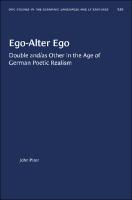Ego-Alter Ego
Double and/as Other in the Age of German Poetic Realism
| dc.contributor.author | Pizer, John | |
| dc.date.accessioned | 2020-06-23T07:43:03Z | |
| dc.date.available | 2020-06-23T07:43:03Z | |
| dc.date.issued | 1998 | |
| dc.identifier | ONIX_20200623_9781469656533_116 | |
| dc.identifier | OCN: 1158017986 | |
| dc.identifier.uri | https://library.oapen.org/handle/20.500.12657/39868 | |
| dc.description.abstract | German Poetic Realists drew on the Romantic motif of the Double in a manner consistent with the central dictum of Poetic Realism as articulated by its chief theorists, Julian Schmidt and Otto Ludwig. Schmidt and Ludwig argued that contemporary authors should, above all, strive for psychological and aesthetic totality in their narrative representations, turning away from the Romantic fantastic but also avoiding the fragmentary approach to the portrayal of everyday life that Ludwig found in early Naturalism. The 'poetic' presentation of reality adheres to quotidian life but strives to show it in all its many dimensions. While Romantic Doppelgänger are often preternatural figures, the Poetic Realists configure egos and their narrative Others ('alter egos,' who are also sometimes physical Doubles) to portray characters in their psychological comprehensiveness. After offering an overview of the Romantic Double motif and its connections to the theory of Poetic Realism, John Pizer analyzes the work of Annette von Droste-Hülshoff, Otto Ludwig, Conrad Ferdinand Meyer, Gottfried Keller, Theodor Storm, and Wilhelm Raabe. | |
| dc.language | English | |
| dc.relation.ispartofseries | UNC Studies in the Germanic Languages and Literatures | |
| dc.subject.classification | thema EDItEUR::D Biography, Literature and Literary studies::D Biography, Literature and Literary studies::DS Literature: history and criticism | en_US |
| dc.subject.other | Poetry | |
| dc.subject.other | German Studies | |
| dc.subject.other | Literature | |
| dc.title | Ego-Alter Ego | |
| dc.title.alternative | Double and/as Other in the Age of German Poetic Realism | |
| dc.type | book | |
| oapen.identifier.doi | 10.5149/9781469656533_Pizer | |
| oapen.relation.isPublishedBy | 29b4cf74-8c0a-422f-9d27-e862ca722861 | |
| oapen.relation.isFundedBy | 0314e571-4102-4526-b014-3ed8f2d6750a | |
| oapen.relation.isFundedBy | 0cdc3d7c-5c59-49ed-9dba-ad641acd8fd1 | |
| oapen.series.number | 120 | |
| oapen.pages | 176 | |
| oapen.place.publication | Chapel Hill | |
| oapen.grant.number | [grantnumber unknown] | |
| oapen.grant.number | [grantnumber unknown] | |
| oapen.grant.program | Humanities Open Book Program | |
| oapen.grant.program | Humanities Open Book Program |

